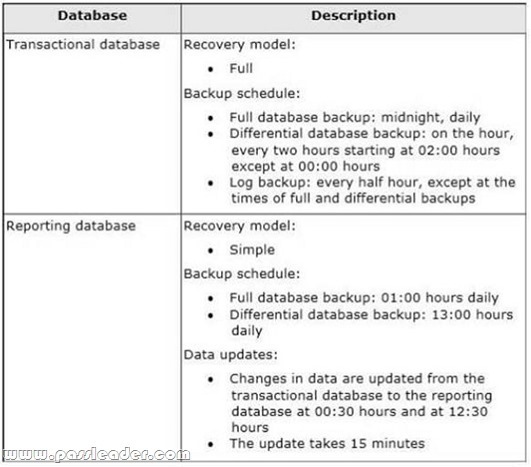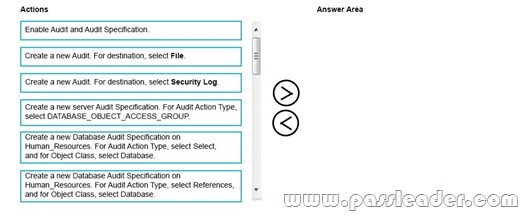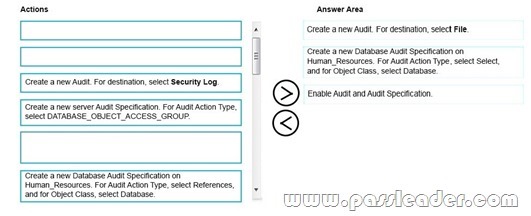New Updated 70-462 Exam Questions from PassLeader 70-462 PDF dumps! Welcome to download the newest PassLeader 70-462 VCE dumps: http://www.passleader.com/70-462.html (243 Q&As)
Keywords: 70-462 exam dumps, 70-462 exam questions, 70-462 VCE dumps, 70-462 PDF dumps, 70-462 practice tests, 70-462 study guide, 70-462 braindumps, Administering Microsoft SQL Server 2012 Databases Exam
NEW QUESTION 198
You administer a Microsoft SQL Server 2012 server that hosts a transactional database and a reporting database. The transactional database is updated through a web application and is operational throughout the day. The reporting database is only updated from the transactional database. The recovery model and backup schedule are configured as shown in the following table:
One of the hard disk drives that stores the reporting database fails at 23:32 hours. You need to ensure that the reporting database is restored. You also need to ensure that data loss is minimal. What should you do?
A. Perform a page restore.
B. Perform a partial restore.
C. Perform a point-in-time restore.
D. Restore the latest full backup.
E. Restore the latest full backup. Then, restore the latest differential backup.
F. Restore the latest full backup, and restore the latest differential backup. Then, restore the latest log backup.
G. Restore the latest full backup, and restore the latest differential backup. Then, restore each log backup taken before the time of failure from the most recent differential backup.
H. Restore the latest full backup. Then, restore each differential backup taken before the time of failure from the most recent full backup.
Answer: E
Explanation:
To recover the database, you must restore the latest full backup and then restore the latest differential backup.
Incorrect answers:
A: A page restore is used to repair isolated damaged pages. It is faster than a file restore id only a few individual pages are damaged.
B: Partial restores allow a database that contains multiple filegroups to be restored and recovered in stages.
It works with all recovery models, but is more flexible for the full and bulk-logged models than for the simple model.
C: Point in time restores are not supported for the simple backup model as log files are not part of the backup.
D: The latest full backup was performed at 01:00 hours, 22 hours and 32 minutes before the hard disk failure. A differential backup was made at 13:00 hours, 10 hours and 32 minutes before the hard disk failure. A differential backup contains data that has been added or updated since the last full backup and should be restored to minimize data loss.
F, G: There is not log backup in the simple backup model.
H: Only the latest differential backup needs to be restored.
https://msdn.microsoft.com/en-us/library/ms186216%28v=sql.110%29.aspx
https://technet.microsoft.com/en-us/library/ms175168%28v=sql.110%29.aspx
https://msdn.microsoft.com/en-us/library/ms177425%28v=sql.110%29.aspx
https://msdn.microsoft.com/en-us/library/ms175526%28v=sql.110%29.aspx
NEW QUESTION 199
Drag and Drop Question
You administer a Microsoft SQL Server 2012 database named Human_Resources. You need to ensure that all read activity against any object in the Human_Resources database is audited and written to a text file. What should you do? (To answer, move the appropriate actions from the list of actions to the answer area and arrange them in the correct order.)
Answer:
Explanation:
The general process for creating and using an audit is as follows.
1. Create an audit and define the target.
2. Create either a server audit specification or database audit specification that maps to the audit. Enable the audit specification.
3. Enable the audit.
4. Read the audit events by using the Windows Event Viewer, Log File Viewer, or the fn_get_audit_file function.
https://msdn.microsoft.com/en-us/library/cc280386%28v=sql.110%29.aspx
https://msdn.microsoft.com/en-us/library/cc280663%28v=sql.110%29.aspx
NEW QUESTION 200
You administer a Microsoft SQL Server 2012 Enterprise Edition server that uses 64 cores. You discover performance issues when complex calculations are performed on large amounts of data under heavy system load. You need to limit the number of cores that process the calculations. What should you configure?
A. Max worker threads
B. Processor affinity
C. I/O affinity
D. Lightweight pooling
Answer: B
Explanation:
To carry out multitasking, the operating system sometimes moves process threads among different processors. This is efficient from an operating system point of view, but can reduce SQL Server performance under heavy system loads, as each processor cache is repeatedly reloaded with data. Assigning processors to specific threads can improve performance under these conditions by eliminating processor reloads; such an association between a thread and a processor is called processor affinity.
https://msdn.microsoft.com/en-us/library/ms189629%28v=sql.110%29.aspx
NEW QUESTION 201
……
NEW QUESTION 203
Which of the following conditions must exist prior to restoring a system database in SQL Server 2012?
A. The hard drive must be reformatted.
B. You must detach the user databases from the SQL 2012 instance.
C. The SQL Server 2012 instance must be started in single-user mode.
D. The SQL Server 2012 instance must be removed.
Answer: C
Explanation:
https://msdn.microsoft.com/en-us/library/ms188236(v=sql.110).aspx
NEW QUESTION 204
Which of the following is the default instance name in an SQL Server 2012 installation?
A. SQLSERVER12
B. MSSQLSERVER
C. MSSQL
D. 2012SQL
Answer: B
Explanation:
https://msdn.microsoft.com/en-us/library/ms143547(v=sql.110).aspx
NEW QUESTION 205
In which of the following statements about audit information stored in an SQL Server 2012 environment is TRUE?
A. It is located in a file specified in the File Path property of the Audit.
B. It is located in the Audit table in the MSDB database.
C. Each login has an audit record, which is viewable under Logins -> Audit.
D. SQL 2012 does not store any audit information.
Answer: A
Explanation:
https://msdn.microsoft.com/en-us/library/cc280525(v=sql.110).aspx
NEW QUESTION 206
……
Download the newest PassLeader 70-462 dumps from passleader.com now! 100% Pass Guarantee!
70-462 PDF dumps & 70-462 VCE dumps: http://www.passleader.com/70-462.html (243 Q&As)




